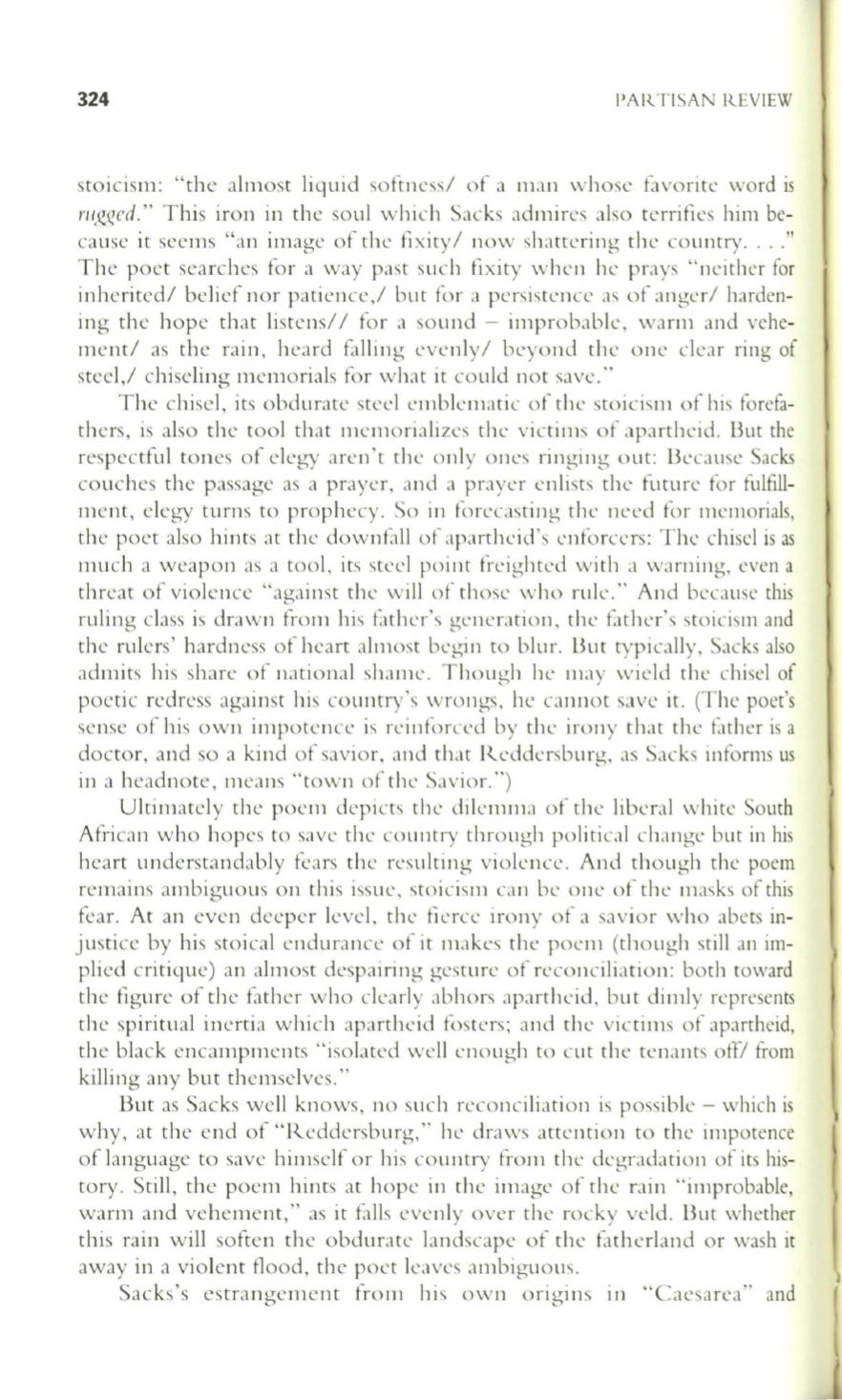
324
I'A"T ISAN ItEVIEW
stoicism: "the almost liquid softness/ of a man whose favorite word is
YIIg{?cd ."
This iron in the soul which Sacks admires also terrifies him be–
cause it secms "a n imagc of the fixity/ now shattering the country...."
The poct searches for a way past such fixity when he prays "neither for
inhcrited/ belief nor patience ,! but for a persistence as of anger/ harden–
ing the hope that listens/ / for a sound - improbable, warm and vehe–
ment/ as thc rain, hca rd falling evenly/ beyond the one cle:H ring of
stcel,! chiseling memorials for what it could not save."
The chiscl, its obdurate steel emblematic of the stoicism of his forefa–
thers, is also thc tool that mcmoriali zes thc victims of apartheid. But the
respc ctful tones of elegy aren't the only oncs ringing out: 13cca usc Sacks
couches the passagc as a prayer, and a prayer cnlists the futurc for fulfill–
mcnt, elegy turns to prophccy. So in forccasting the need for melllorials,
the poet also hints at the downf:1ll of apartheid's enforcers: The chisel is as
much a weapon as a tool, its steel point freighted with a warning, cven a
threat of violencc "against the will of those who rule." And because this
ruling class is drawn from his f..lther's generation, the father's sto icism and
the rulers' hardness of heart almost begin to blur. But typically, Sacks also
admits his share of national shame. Though he ma y wield the chi sel of
poetic redress against his country's wrongs, he cannot save it. (The poet's
sense of his own impoten ce is reinforced by the iro ny that the fuher is a
doctor, and so a kind of sav ior, and that R.eddersburg, as Sacks informs
lIS
in a headnote , means "town of the Savior.")
Ultimately the poem depicts the dilemma of the liberal white South
African who hopes to save the country through political change but in his
heart understandably fears the resulting violence. And though the poem
remains ambiguous on this issue , sto icism can be one of the masks of tins
fear. At an
cven
deeper level, the fierce irony of a sav ior who abcts in–
justice by his stoi ca l endurance of it makes the poem (though still an im–
plied critique) an almost despairing gesture of reconciliation: both toward
the figurc of the father who clearly abhors apartheid, but dimly represents
the spiritual inertia which apartheid fosters; and the victims of apartheid,
the black encamplllents "isolated well enough to cut the tenants
ofT/
from
killing any but themselves."
But as Sacks well knows, no such reconciliation is possible - which is
why, at the end of "Reddersburg," he draws attention to the impotence
of language to save himself or hi s country from the degradation of its his–
tory . Still, the poem hints at hope in the image of the rain "i1l1probable,
warm and vehcment," as it f..llls evenly over the rocky
veld.
13ut whether
this rain will soften the obdurate landscape of the fatherland or wash it
away in a violent flood , the poet leaves ambiguous.
Sacks's cstrangement from his own origins in "Caesa rea " and


